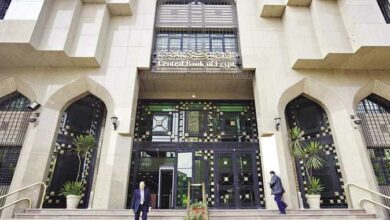Yields at Egyptian Treasury bill auctions have hit levels last seen during the 2008 global financial crisis and traders said on Tuesday they could go higher still if the government does not secure external funding for its budget deficit.
The government, which turned down a US$3 billion loan package from the International Monetary Fund in June, has said it will rely on the local market to plug its financing needs, which have mushroomed after an uprising that ousted President Hosni Mubarak early this year.
Egypt's banks are feeling squeezed and demanding higher yields at debt auctions, sometimes too high for the central bank to accept. At the current pace, the government is seeking to raise more than LE50 billion ($8.3 billion) a month, debt traders estimate.
One trader said Cairo, which is discussing financing with Gulf Arab states and also said this week it is open to cooperation with the IMF, could not rely on funding from local banks for longer than a few more months.
The average yields on T-bills issued on Tuesday were 12.93 percent for 91-day and 13.24 percent for 182-day , levels last seen during a spike in October 2008 when the global financial system was strained.
In 2008, yields quickly fell back, but there is no sign of a respite now. Egypt canceled an auction of two- and three-year bonds on Monday, which traders said was because banks demanded yields that were too high for the government to accept.
Egyptian banks are reluctant to commit long-term with yields rising, while the instability of global markets and a slowing world economy are deterring interest in Egyptian debt among private foreign investors.
"The Finance Ministry is under a lot of pressure. There are no foreigners in the market, reserves are decreasing and there is no revenue coming in," said one trader at an Egyptian bank, who like others asked not to be named because of the sensitivity of the issue.
Foreign reserves have tumbled $11 billion since December to $25.01 billion in August. Although the pace of the fall has slowed, reserves have continued to edge lower.
"The deficit is increasing and there is no money coming in. It seems they are looking at the IMF and the World Bank again, after they said they rejected the initial loan," the trader said.
Finance Minister Hazem al-Beblawy told Reuters on Monday that he was open to "all sorts of cooperation" when he holds meetings at the IMF and World Bank this month. He also said he was discussing financing with Saudi Arabia and the United Arab Emirates that could exceed $5 billion, but gave no details or a timetable.
Masood Ahmed, director of the IMF's Middle East and Central Asia department, told Reuters last week that the Fund remained willing to lend money to Egypt if Cairo changed its mind and asked for assistance.
He also said the IMF was encouraged by some economic policy changes planned by the Egyptian government, including reforms to its subsidy system that would improve the distribution of cooking gas to poor people, and moves to raise the prices paid to farmers for their crops.
Political conditions
A Cairo-based trader pointed to an upcoming auction of six-month T-bills as a sign of the pressure on the government. In more normal times, the central bank, acting on behalf of the Finance Ministry, would offer LE1.5-2 billion worth of bills, he said.
On Thursday, it will offer 182-day bills worth LE4 billion, hiking the amount without explanation after initially saying it would offer LE2.5 billion.
Central bank officials could not be reached to comment.
"I don't believe by the end of the quarter or end of the year it will be more optmistic," the Cairo trader said. He added that tensions in the debt market were related to political uncertainty, "so it won't calm down or be stable unless we have a clear view of what Egypt will be in six months or one year."
At the current rate, he said, one-year T-bills could have yields of 17 or 18 percent at the beginning of 2012, up from around 14 percent now, unless Egypt found fresh sources of funds outside the country.
Before the uprising destabilized the economy, the government was raising about LE40 billion a month, compared with the current pace of more than LE50 billion, he estimated.
Another trader was more sanguine, however. "The local market is greedy. Each time it tries to get a higher yield but in general, the local market is capable of financing the deficit," he said, although he added that pressure on local banks was rising.
When Egypt turned down the IMF package in June, the financial terms and policy conditions attached to the loans were not onerous; a major factor behind the decision appeared to be the reluctance of the country's new government to be seen to be depending on foreign aid.
The government also said it had revised its budget so that the deficit would be 8.6 percent of gross domestic product in the 2011/12 fiscal year, down from an original forecast of 11 percent. Economists said the new figure was over-optimistic, however, particularly since Egypt is struggling to get growth back on track.
The economy grew more slowly than the government had forecast in the year to June 30, expanding by 1.8 percent. The government forecasts growth of 3 to 3.5 percent in 2011/12 but analysts say that prediction may also prove too upbeat.




